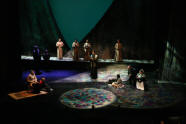|
That was the question posed at a German exam some 45 years
ago, when it was to be decided what the better reward for an
actor is. Coming from a family with a performance background
this was a most interesting question for me and much debated in
our house.
While applause always means approval, silence does not
necessarily. Silence could signal protest or disapproval for all
sorts of specific reasons, or be a sign of great respect for the
extraordinary portrayal of a character or great drama. Silence
is always a potent signal. This was very apparent at the end of
the performance I attended of this North American premier of an
opera with a most unusual theme, created by a most unusual team
of women: Ella Milch-Sherrif, who composed the music and wrote
the Libretto together with Nava Semel, whose original book about
the hidden children of the Holocaust, was inspired to do this
opera. Both are prolific creative people with many works to
their credit. Both these women are children of survivors and are
picking up history from where the parents did not want to
remember or talk about it.
The original book followed a conference in New York where it was
discovered that many Jewish children were hidden in the country,
often in plain sight, as I was told once by a well known painter
related to Heinrich Heine, Manfred Heine-Beaux. Not all
arrangements were selfless; some of them were commercially
exploited, as was the one in this story with an unusual twist.
Greed is a powerful ally of evil, as we know and have
demonstrated almost daily in our present lives. But there were
righteous among the nation as this opera tells us. It is a
composite story around one girl, how she was hidden by farmers,
abused by their son and salvaged by a catholic priest at his
peril.
 |
| The cast and stage segments
of "And the Rat laughed" |
The story has 4 different perspectives: The actual story as it
is told to a granddaughter for her school assignment by her
grandmother here and now, the happening in the past to the girl
in the pit with the rat, the remembering through memory chip of
2 people 100 years into the future, and finally all aspects
coming together, the natural memories, the implanted memories,
the confronting of a past and the understanding of the child in
present time. Harmony and relief is intimated in this final
scene. The horrors of the past are to be assimilated and
rendered less horrifying; perhaps there is forgiveness or
understanding of human nature at play, so the future has a
chance to unfold without the burden of past deeds.
There is just one tiny point of discontent with that philosophy
for me: It has been proven that anything that is in some way
enforced does not carry good fruit. Thus the idea of implanting
people with memory chips, no matter how popular and workable it
might appear right now, is not a good way of countering man’s
inhumanity to man; it is another mechanism to enslave to
something rejected and will ultimately backfire.
This was truly a potent story, never told like this before. The
powerful musical score afforded a multitude of emotions to be
expressed in explicit detail, nearly making the English
supertitles unnecessary. Frank Pasian outdid himself with a
simple yet very well organized set dividing and aligning the
simultaneous scenes into a timeline that created better
understanding. The artistic direction fell to Geoffrey Butler,
who is credited with creating an equal if not better than the
original Israeli production, I have been told.
The singers were well chosen for their voices and ability to
act. Some of them where familiar, others not. The part of the
young girl in the pit with the rat was no other than the artist
who has performed this part many, many times in Israel, Einat
Aronstein. She had to ask for special dispensation from the
Israeli army to come to Toronto and perform here.
Adriana Albu sang the part of the grandmother, Angela Burns was
her granddaughter.
Melanie Gall sang the futuristic Lima Energelly with Andrew Tees
as Stash. Gerrit Theule and Ramona Carmelly as the greedy farmer
couple handed over the child to Dion Mazerolle as the Priest,
Father Stanislaw.
All other posts were filled to perfection as before and better.
Opera York is truly a professional company deserving of the full
support the establishment has to offer. We are looking forward
to more exciting offerings and more recognition after this
latest presentation that left us speechless and unable to
instantly applaud. Silence was the accolade that validated this
fine production.
|
|




